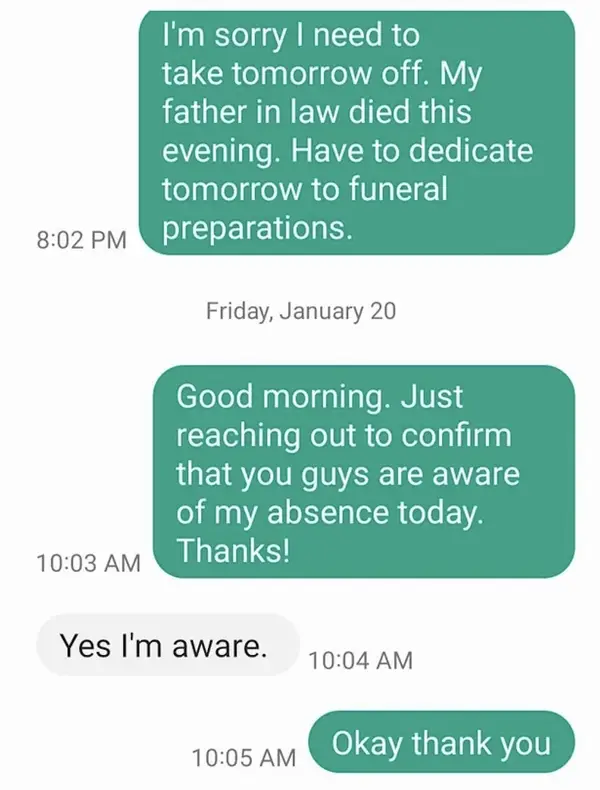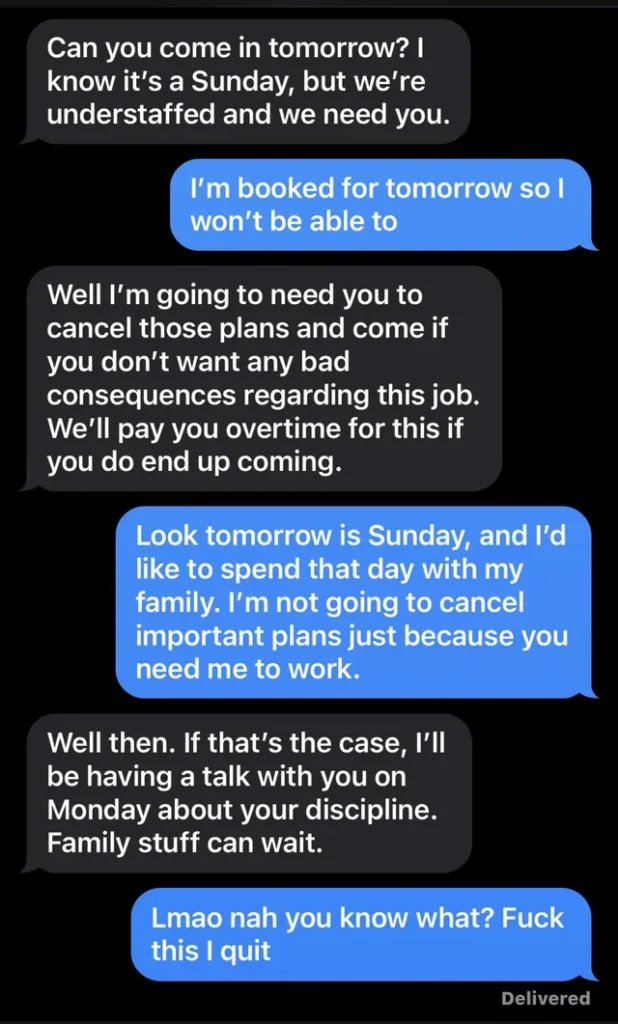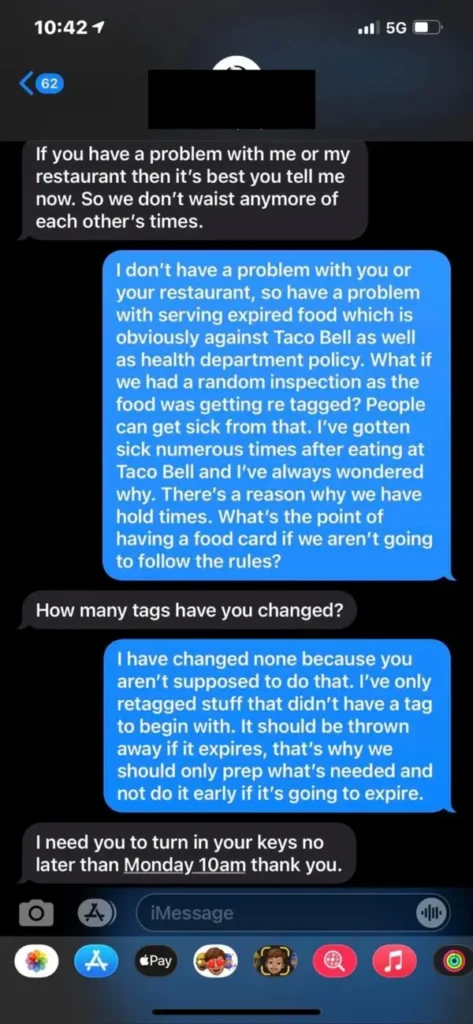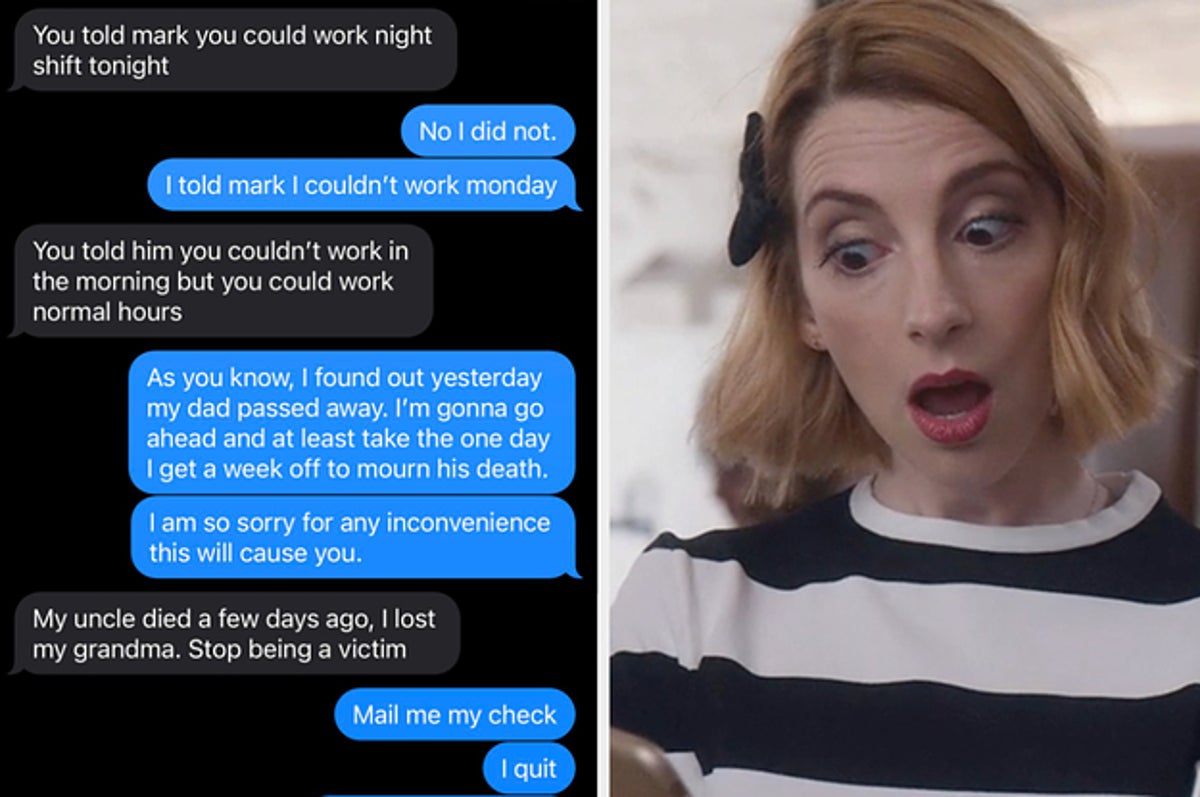In today’s digital age, communication has become easier and more convenient than ever before. With the advent of mobile technology, it has become common for bosses to communicate with their employees via text messages. While texting can be a quick and efficient means of communication, it is important to recognize that not all messages are created equal. In this article, we will explore 20 toxic texts that bosses should avoid sending to their employees. These messages can have detrimental effects on workplace relationships, productivity, and employee morale. By understanding the negative impact of these texts, bosses can foster a healthier and more positive work environment.
20 Toxic Texts
Here are some of the most despicable and repulsive text messages ever sent by bosses that will make you lose faith in participating in capitalism ever again:
1. This boss’ response to a positive COVID test:

When faced with news of a positive COVID test, this boss’s response was shockingly callous and uncaring. Instead of expressing concern or offering support, they displayed a complete lack of empathy and responsibility. Such indifference towards the well-being of their employees is deeply troubling and reflects a severe disregard for human life.
2. This boss who has zero compassion:

This boss’s complete lack of compassion is truly disheartening. They show no regard for the struggles or challenges faced by their employees, disregarding their emotional well-being entirely. Such behavior not only undermines morale but also highlights a profound absence of empathy and understanding.
3. This response from a boss after an employee asked for a raise:

The boss’s response to the employee’s request for a raise was incredibly disappointing. Instead of considering the employee’s hard work and contributions, they dismissed the request without providing any valid justification or constructive feedback. This kind of dismissive attitude towards fair compensation can lead to demotivation and a lack of loyalty among the workforce.
4. The boss who went on the attack in a group thread that every other employee could read:

The boss’s aggressive behavior in a group thread, visible to all employees, was highly unprofessional and concerning. Rather than addressing any concerns or issues privately and respectfully, they chose to publicly attack and belittle someone. Such behavior creates a toxic work environment, erodes trust, and undermines the overall team dynamics.
5. This boss who conveyed just how much of a dick they are with just three words:

The boss’s three-word response revealed their true nature as a disrespectful and unpleasant individual. Such brevity in conveying their disdain or rudeness speaks volumes about their character and lack of professionalism. It’s disheartening to witness such behavior from someone in a position of authority.
6. This boss who doesn’t understand the concept of “no work on the weekends”:

This boss’s inability to comprehend the concept of “no work on the weekends” is deeply concerning. Their disregard for work-life balance and boundaries shows a lack of respect for their employees’ personal time and well-being. It is essential for a healthy work environment that employers understand and promote the importance of rest and time away from work to maintain productivity and employee satisfaction.
7. This boss who reckons it’s okay to text people after they’ve been let go:

8. This boss who decided that workers should only be paid four hours of a six-hour trial shift:

9. This boss who literally suspended a worker for sharing a meme:

10. This boss who was like, “Hmm maybe move the appointment for your dying dog so it suits me”:

11. This boss who was scandalized to hear a worker actually wanted to be paid for their time:

12. This boss who told a worker they were being a victim for wanting a day off after their dad’s death:

13. This boss who couldn’t fathom that some of us have a life outside work:

14. This job who was like “I do not care if your foot is broken you MUST STAND ON IT”:

15. This boss who fired an employee for bringing up questionable food safety standards:

The Demanding Text: A Recipe for Stress
One of the most toxic texts a boss can send to an employee is a demanding message that places unnecessary pressure and stress. Such texts often imply urgency and create a sense of anxiety, leaving the employee feeling overwhelmed and unable to perform their tasks effectively.

The Vague Instruction: Guesswork and Frustration
When a boss sends a text with vague instructions, it leaves the employee confused and frustrated. Without clear guidance, the employee may struggle to understand what is expected of them, leading to errors and inefficiency.

The Late-Night Text: Invasion of Personal Time
Bosses should respect their employees’ personal time and boundaries. Sending text messages during non-working hours can disrupt their personal lives, create a constant feeling of being “on call,” and lead to burnout.

The Passive-Aggressive Text: Undermining Trust
Passive-aggressive texts damage trust and create a hostile work environment. These messages may appear innocent on the surface, but they carry undertones of sarcasm, criticism, or mockery, undermining employee confidence and team morale.
The Excessive Texts: Information Overload
Bombarding employees with a barrage of texts can lead to information overload. Employees may find it difficult to prioritize tasks or may miss important details amidst the sea of messages, resulting in confusion and reduced productivity.
The Negative Feedback Text: Destructive Criticism
Offering negative feedback via text message is not only impersonal but also lacks the necessary context for constructive dialogue. Such texts can demoralize employees, damage their self-esteem, and hinder professional growth.
The Public Call-Out: Embarrassment and Humiliation
Publicly calling out an employee’s mistake or underperformance via text is highly unprofessional and can cause embarrassment and humiliation. It erodes trust and creates a toxic work environment.
The Insensitive Text: Lack of Empathy
Sending insensitive texts that disregard an employee’s personal situation or challenges shows a lack of empathy. It alienates employees and diminishes their loyalty and commitment to the organization.
The Micromanagement Text: Lack of Autonomy
Constantly checking in on employees and requesting updates through texts indicates a lack of trust and confidence. Micromanagement inhibits employee autonomy, stifles creativity, and hampers overall productivity.
The Impersonal Text: Alienation and Disconnect
Text messages lacking personalization can make employees feel like just another cog in the machine. Failing to address employees by name or acknowledge their individual contributions can lead to a sense of alienation and disconnection.
The Inconsistent Text: Confusion and Uncertainty
Inconsistent or contradictory texts from a boss create confusion and uncertainty among employees. They may struggle to determine the correct course of action, leading to mistakes and inefficiencies.
The Unprofessional Text: Damaging Reputation
Sending unprofessional texts, filled with grammatical errors, slang, or inappropriate language, reflects poorly on the boss and the organization as a whole. It undermines credibility and damages the professional reputation of both parties.
The Guilt-Tripping Text: Emotional Manipulation
Guilt-tripping texts that aim to manipulate employees into complying with unreasonable demands are toxic and harmful. They induce stress, diminish employee well-being, and erode trust within the workplace.
The Rude Text: Disrespect and Disregard
Bosses should communicate with their employees respectfully and professionally. Sending rude or disrespectful texts undermines employee morale, creates a hostile work environment, and hampers teamwork.
The Overly Casual Text: Blurring Boundaries
Maintaining a certain level of professionalism is crucial in the workplace. Overly casual texts, filled with slang or informal language, blur the boundaries between personal and professional relationships and may diminish respect.
The Overly Familiar Text: Breach of Professionalism
Text messages that cross the line into overly familiar or intimate territory breach professionalism. They can make employees uncomfortable and create a power imbalance within the workplace.
The Ignoring Text: Disregarding Employee Input
Ignoring or failing to respond to employee texts sends a message of disregard and indifference. It inhibits effective communication, stifles collaboration, and hampers the flow of information within the organization.
The Overloading Text: Unrealistic Expectations
Sending texts with an overwhelming number of tasks and deadlines places unrealistic expectations on employees. This can lead to burnout, stress, and reduced job satisfaction.
The Dismissive Text: Invalidating Employee Concerns
When a boss dismisses an employee’s concerns or problems through text, it invalidates their experiences and diminishes their trust in the organization. Employees need to feel heard and supported by their superiors.
The Non-Constructive Feedback: Lack of Guidance
Text messages that provide non-constructive feedback without guidance for improvement hinder employee growth and development. Effective feedback should be specific, actionable, and supportive.
The Controlling Text: Impeding Growth and Innovation
Sending controlling texts that dictate how employees should perform their tasks stifles creativity, innovation, and autonomy. It hampers the growth and development of employees and limits the potential for positive change.
The Text Bombardment: Interruption and Fragmentation
Constantly bombarding employees with text messages disrupts their workflow and creates a fragmented work environment. It is essential to allow employees uninterrupted focus to maintain productivity and efficiency.
The Invasive Text: Personal Intrusion
Bosses should respect the personal lives of their employees. Sending invasive texts that pry into personal matters or demand immediate responses during personal time can create resentment and a poor work-life balance.
The Blaming Text: Shifting Responsibility
Texts that shift blame onto employees instead of fostering a culture of accountability damage morale and trust. It discourages employees from taking risks and learning from mistakes, ultimately hindering growth and innovation.
The Threatening Text: Intimidation and Fear
Threatening texts that evoke fear and intimidation have no place in a healthy work environment. They create a culture of fear, erode trust, and lead to increased stress and anxiety among employees.
Conclusion
Texting has undoubtedly revolutionized communication in the workplace, but bosses must exercise caution and mindfulness in their text messages. By avoiding these 20 toxic texts, bosses can promote positive employee relationships, boost productivity, and create a healthier work environment.
FAQs
Q: Can texting ever be an appropriate form of communication between bosses and employees?
A: Yes, texting can be appropriate for quick updates or urgent matters that require immediate attention. However, it should be used sparingly and with consideration for employees’ boundaries.
Q: How can bosses maintain professionalism while texting employees?
A: Bosses can maintain professionalism by using proper grammar, addressing employees respectfully, and refraining from using informal language or slang.
Q: What are some alternative communication methods bosses can use instead of texting?
A: Alternative methods include face-to-face meetings, phone calls, or utilizing project management tools that allow for organized and centralized communication.
Q: How can bosses provide constructive feedback through text messages?
A: Bosses can provide constructive feedback by being specific, offering guidance for improvement, and acknowledging employees’ efforts and strengths.
Q: What steps can employees take if they receive toxic texts from their bosses?
A: Employees should document the texts, communicate their concerns with HR or a trusted supervisor, and seek support from colleagues or employee assistance programs if necessary.



